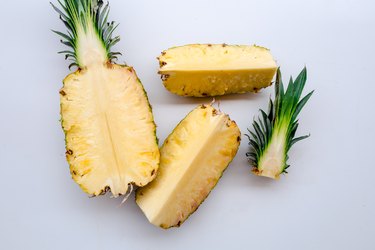
Pineapples are delicious, but eating too much raw pineapple can cause an unpleasant burning feeling on your tongue and the roof of your mouth. It might seem like pineapple acid is the culprit, or maybe a pineapple allergy. In reality, pineapple hurts your mouth because of a unique enzyme called bromelain.
Tip
Roasting, grilling, or baking pineapple breaks down the enzyme that hurts your mouth, so you can enjoy the fruit without pain.
Video of the Day
Read more: What Are The Benefits Of Eating Pineapple?
Video of the Day
Why Pineapple Hurts Your Mouth
Eating fresh pineapple can hurt your mouth because of a certain enzyme called bromelain, according to the University of Melbourne. The university website reports that bromelain, which breaks down proteins, actually starts breaking down your mouth lining just a little bit — causing that burning feeling. Luckily, the strong acid in your stomach breaks down the bromelain in turn, which is why pineapple doesn't cause the same sort of irritation throughout your digestive system.
Another factor is that pineapple is quite acidic, with a pH level between 3.20 and 4.00. According to the Cleveland Clinic, acidic foods like pineapple can trigger a painful canker sore or make an existing canker sore worse. Plus, acidic foods might worsen acid reflux, also known as heartburn.
While bromelain might be the cause of that acid burn feeling after eating pineapple, it is a useful substance. According to the National Center for Complementary and Integrative Health (NCCIH), isolated bromelain can may be helpful in reducing nasal inflammation and removing dead skin from burns, and there's ongoing research into other potential medicinal properties of bromelain.
For example, a January 2019 study published in PLOS One found that bromelain can inhibit the growth of colorectal cancer cells and tumors. However, this experiment was done on mice and zebrafish, so more work is needed to determine whether bromelain could be effective in treating cancer in humans.
How to Avoid Pineapple Burn
You can try various tricks to stop pineapple hurting your mouth, like soaking chunks of pineapple in salt water overnight before eating, cutting out the core of the pineapple or removing the stem. However, the only guaranteed way to remove bromelain from fresh pineapple is to heat the fruit (by grilling it, cooking the pineapple or baking it in a dessert) to denature the enzymes.
Read more: Are There Bad Side Effects of Eating Pineapple?
Symptoms of a Pineapple Allergy
If the inside of your mouth feels itchy after you eat pineapple, you might have oral allergy syndrome, also called pollen-food sensitivity syndrome. According to the American Academy of Allergy, Asthma & Immunology (AAAAI), oral allergy syndrome is when people who are allergic to pollen feel itching or swelling inside their mouth after eating certain types of produce.
This type of allergy has been seen in produce like apples, celery, melon or pineapple. That's because the proteins found in some fruits and veggies are very similar to those found in pollen, which confuses your immune system and causes a reaction.
Symptoms usually appear right after eating raw fruits or veggies and include itching or swelling of your face, lips, mouth, tongue and throat. The AAAAI says that oral allergy syndrome is typically mild, though very serious cases may cause severe throat swelling that affects your breathing.
- American Academy of Allergy, Asthma & Immunology: "Oral Allergy Syndrome"
- National Center for Complementary and Integrative Health (NCCIH): "Bromelain"
- Cleveland Clinic: "Canker Sore"
- Clemson University: "pH Values of Common Foods and Ingredients"
- University of Nebraska-Lincoln Department of Food Science and Technology: "Allergenic Foods and Their Allergens"
- PLOS One: "Bromelain Inhibits the Ability of Colorectal Cancer Cells to Proliferate via Activation of ROS Production and Autophagy"